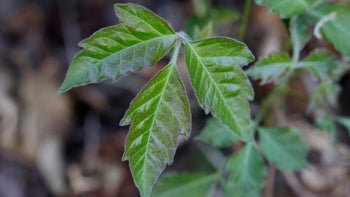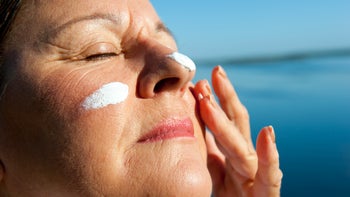
Natural Mosquito Repellent: What Really Works?
Key takeaways:
The only natural mosquito repellent registered with the Environmental Protection Agency (EPA) is oil of lemon eucalyptus. But many other essential oils, such as lemongrass, clove, and patchouli, have been shown to have repelling properties as well.
If you want to increase the chances of finding a natural repellent that works for you, you should buy your essential oils from a reputable source, conduct a patch test, and use a carrier oil.
When traveling to an area with a high risk of mosquito-borne diseases, the CDC recommends using repellents that are registered with the EPA. Most of those are synthetic.

Some synthetic mosquito repellents may be generally safe when used as directed. But they might not be a good option for everyone. And many of the harsh ingredients in these products are not recommended for people with inflammatory skin conditions like psoriasis and acne.
Lounging by the pool covered in mosquito bites doesn’t exactly sound like a relaxing way to spend the summer.
That’s where natural mosquito repellents come in. There are a range of essential oils that insects tend to avoid. They can help you stay free of both chemicals and mosquito bites this season.
Search and compare options
What are the most natural mosquito repellents?
You might be on the hunt for a natural mosquito repellent for many reasons. Maybe your sensitive skin doesn’t tolerate synthetic repellents well, or you want to use products that are more environmentally friendly. Or maybe you just want your mosquito repellent to smell good. Whatever the reason, you have options.
In studies of the mosquito-repelling qualities of various essential oils, there have been some promising results. But there's a need for more research on natural repellents. So the CDC recommends using repellents that are registered with the Environmental Protection Agency (EPA) if you're traveling to an area with a high risk of mosquito-borne diseases. Most of those EPA-approved products are synthetic.
But for situations where the risk of catching a mosquito-borne disease is low, you might experiment with the following natural options:
Oil of lemon eucalyptus
Oil of lemon eucalyptus (OLE) is the only natural repellent approved by the CDC. However, the CDC does not recommend using pure oil of lemon eucalyptus. Instead, the agency suggests using pre-mixed products like Repel’s plant-based spray or Off! Botanicals, because these formulations have been tested and registered with the EPA. But note that some of these products may contain PMD, the synthetic version of OLE.
In one study, OLE provided 2 hours of protection against mosquitoes and ticks. That makes it comparable to synthetic repellents on the market.
Neem oil
Neem oil is a naturally occurring pesticide that is sometimes used to help prevent the spread of disease. A paper outlining results from several studies found that neem oil may be moderately to highly effective in repelling mosquitoes. Researchers in the studies surveyed likely tested different neem oil mixtures, which may explain the varying results.
Read more like this
Explore these related articles, suggested for readers like you.
Lemongrass oil
You might know lemongrass as a popular ingredient in Southeast Asian cuisine. But this herb has many uses. One study found that lemongrass oil combined with olive oil provided around 98% protection against southern house mosquitoes for 2 to 2.5 hours. Southern house mosquitoes can be found in the tropics and the southern third of the continental United States, from Southern California to Virginia.
Clove oil
Not only does this spice have antibacterial and antioxidant properties but it may also repel mosquitoes. One study found that clove oil kept Ae. Aegypti mosquitoes away for 1.5 to 2 hours. These mosquitoes live in tropical and subtropical climates, and sometimes in temperate areas as well.
However, another study found that clove oil on its own was an ineffective repellent because it evaporated quickly. Researchers in the study found that combining the oil with vanillin (a chemical found in vanilla beans) could help prevent evaporation.
Patchouli oil
Many people either love or hate the smell of patchouli. And just as opinions of the oil are mixed, and so is the research on how effective it is at keeping mosquitos away. Patchouli alone may not be a good mosquito repellent, but tinkering with the formulation may increase its effectiveness.
One study found that combining patchouli oil with an alcohol base made it effective. Another study showed that combining patchouli with sage oil prolonged the protection time to over 4 hours against various mosquitoes found in the southern and eastern parts of the U.S.
Peppermint oil
Peppermint oil has many uses, from relieving upset stomachs and headaches to soothing sore muscles. And it's been shown to repel mosquitoes found across the U.S. Some research suggests that it may work for up to 3 hours.
Cinnamon oil
Cinnamon oil might keep mosquitoes and ticks away. Researchers found that an organic lotion containing cinnamon oil repelled mosquitoes that live in many parts of the U.S. for 1.5 to 2 hours. This mixture was also found to be successful in warding off ticks.
Catnip oil
It's called catnip for a reason. And while cats love it, insects certainly do not. Studies show that oil from this herb is a great natural mosquito repellent. Researchers think mosquitoes and other insects avoid catnip oil because it activates their pain receptors.
Citronella oil
You've probably come across citronella candles and fragrances while looking for a natural mosquito repellent. These products may provide some protection, but the evidence is mixed.
One study found that a citronella oil–based body cream repelled mosquitoes. Researchers also found that a cream with citronella, lemongrass, and clove oil was even more effective.
Other studies show that citronella alone may not be the best option, because it tends to evaporate quickly, leaving you exposed to mosquitoes.
Why are mosquitoes attracted to you?
Are you a person who brings bug spray to every outdoor adventure while your friends lounge around without protection and never get bitten? If you think mosquitoes are especially attracted to you, it's probably not all in your head.
It might have something to do with your natural scent. Your body releases carboxylic acids when you sweat. Mosquitoes are attracted to the smell of these chemical compounds. So people with higher levels of carboxylic acids on their skin are more attractive to these pesky insects.
But there are other reasons why you might attract mosquitoes. For example, people with Type O blood may be more likely to get bitten by mosquitoes.
If you're a mosquito magnet now, chances are you will be for life. But here's the good news: Now that scientists have a better understanding of what attracts and repels mosquitos, they can develop better repellents.
How to use natural mosquito repellents
Ready to give natural mosquito repellents a try? There are a few things to remember before diving in.
Buy your essential oils from a reputable source. The FDA doesn't regulate essential oils, so there are many faulty products on the market. Look for reputable sources that sell quality products. And read the labels to make sure you get the essential oil you want.
Test the repellent in low-risk situations. There's a need for more research on natural insect repellents. And the proper formulations still need to be worked out. So you should only test repellents in areas with a very low risk of mosquito-borne diseases.
Use carrier oils. If you're applying an essential oil to your skin, always dilute it with a carrier oil like coconut, olive, or argan. You can start with 6 to 12 drops of essential oil per ounce of carrier oil.
Patch test new products. You might be allergic to certain essential oils. So it's best to test essential oil on a small section of your skin and see how your skin reacts.
The bottom line
There is a lot of research on natural alternatives to synthetic mosquito repellents. And experimenting with essential oil combinations in situations where there is a low risk of catching a mosquito-borne disease can be a good option for people trying to avoid artificial ingredients. Using carrier oils, conducting a patch test, and buying your essential oils from a reputable source can increase your chances of finding a natural mosquito repellent that works for you.
Why trust our experts?



References
American Academy of Dermatology Association. (2021). How to test skin care products.
Ansari, M. A., et al. (2000). Larvicidal and mosquito repellent action of peppermint (Mentha piperita) oil Author links open overlay panel. Bioresource Technology.
Bond, C., et al. (2012). Neem oil general fact sheet.National Pesticide Information Center, Oregon State University Extension Services.
Centers for Disease Control and Prevention. (n.d.). Fight the bite for protection from malaria guidelines for DEET insect repellent use.
Centers for Disease Control and Prevention. (2023). Potential range of Aedes aegypti and Aedes albopictus in the United States, 2017.
De Obaldia, M. E., et al. (2022). Differential mosquito attraction to humans is associated with skin-derived carboxylic acid levels. Cell.
Deng, W., et al. (2023). Repellent screening of selected plant essential oils against dengue fever mosquitoes using behavior bioassays. Neotropical Entomology.
Halcón, L. (n.d.). How do I determine the quality of essential oils? Taking Charge of your Health & Wellbeing.
Hazarika, H., et al. (2022). The fabrication and assessment of mosquito repellent cream for outdoor protection. Scientific Reports.
Hill, S., et al. (2019). Southern house mosquito Culex quinquefasciatus Say. University of Florida IFAS Extension.
Kang, S., et al. (2009). Comparative repellency of essential oils against Culex pipiens pallens (Diptera: Culicidae). Journal of the Korean Society for Applied Biological Chemistry.
Lee, M. Y. (2018). Essential oils as repellents against arthropods. BioMed Research International.
Luker, H. A., et al. (2023). Repellent efficacy of 20 essential oils on Aedes aegypti mosquitoes and Ixodes scapularis ticks in contact-repellency assays. Scientific Reports.
Maia, M. F., et al. (2011). Plant-based insect repellents: A review of their efficacy, development and testing. Malaria Journal.
Melo, N., et al. (2021). The irritant receptor TRPA1 mediates the mosquito repellent effect of catnip. Current Biology: CB.
Mutebi, J., et al. (2023). Mosquitoes, ticks & other arthropods. CDC Yellow Book: Health Information for International Travel.
New York State Department of Health. (2009). DEET tips: For proper protection.
Nuñez, L., et al. (2012). Microbicide activity of clove essential oil (Eugenia caryophyllata). Brazilian Journal of Microbiology: Publication of the Brazilian Society for Microbiology.
Orchard, A., et al. (2019). The influence of carrier oils on the antimicrobial activity and cytotoxicity of essential oils.
Prasadini, M., et al. (2019). Blood feeding preference of female Aedes aegypti mosquitoes for human blood group types and its impact on their fecundity: Implications for vector control. American Journal of Entomology.
Reichert, W., et al. (2019). Repellency Assessment of Nepeta cataria essential oils and isolated nepetalactones on Aedes aegypti. Scientific Reports.
Roy, D. N., et al. (2017). The insect repellents: A silent environmental chemical toxicant to the health. Environmental Toxicology and Pharmacology.
Soonwera, M., et al. (2015). Efficacy of Thai herbal essential oils as green repellent against mosquito vectors. Acta Tropica.
Sutthanont, N., et al. (2022). Effectiveness of herbal essential oils as single and combined repellents against Aedes aegypti, Anopheles dirus and Culex quinquefasciatus (Diptera: Culicidae). Insects.
Yoon, J. K., et al. (2015). Comparison of repellency effect of mosquito repellents for DEET, citronella, and fennel oil. Journal of Parasitology Research.





























